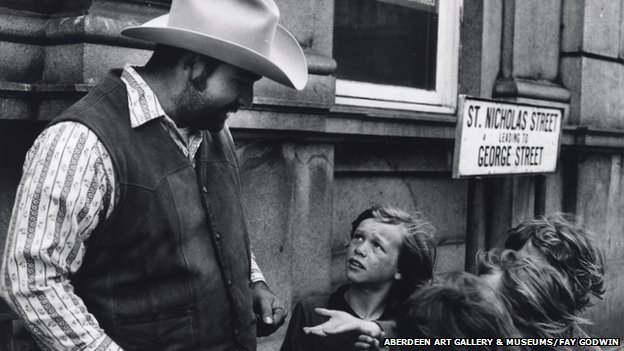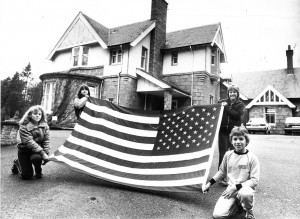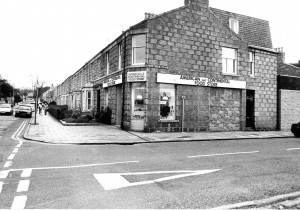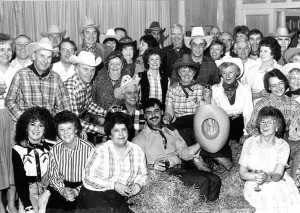
British war-time comedian Tommy Trinder is widely credited with coining the phrase – “over-fed, over-paid, over-sexed and over here” when referring to American GIs during World War Two.
For Aberdeen and north-east Scotland, a second US invasion took place in the 70s.
Estimates in 1975 put the number of Americans living in Aberdeen at around 4,000 out of a city population of 200,000.
Notwithstanding the intentions, amorous or otherwise, of some American oilmen, attitudes to the influx of stetson wearing, high-falutin roustabouts in the pubs and streets of the Granite City 40-years ago were decidedly mixed.
Professor Alex Kemp, professor of Petroleum Economics at Aberdeen University, recalls not everyone was pleased to see the “brash Americans coming across with their very big salaries and throwing their money around” in the 70s.
He said: “Once the Forties field was discovered in UK waters in 1970, there was significant interest from many international companies who wanted to explore and develop the many discoveries in the North Sea.
“There was little indigenous offshore knowledge or skills in the UK at the time. The new industry needed experience at every level from roughnecks and roustabouts to senior management.
“Hundreds flew in from the US oil-producing states such as Texas and Louisiana with their big boots and big hats and big spending.”
“They were all on expenses and were highly paid. UK wages were low and Aberdeen wages were well below the UK national average, therefore the difference was even more pronounced.”
“Americans with their loud voices and cigars could be found in the bars spending a lot of money. They used to celebrate every time they struck oil – which was often. Many Aberdonians resented it, but there is no doubt their influence had a lasting, largely positive, effect.”
Watering holes such as Ruffles, the Grill, Radars and the Earls Court all serviced an increasingly cosmopolitan clientele.
Prof. Kemp said that many traditional businesses lost workers to oil because they were unable to compete with the wages earned offshore.
It’s always easy to portray the sterotype and for every fast and loose Dallas cowboy, there were dozens of hard-working families who added vibrancy and vitality to the communities they lived in.
So many “expats” found their way to the North east that they opened their own school. The American School (now known as the International School) was established in 1972, with a school role of 36 students from kindergarten through 12th grade.
The original school was located on Craigton Road in Cults before moving to Milltimber in 1996 and changing its name to the International School, reflecting a wider range of expat pupils. In 2010 it moved again, to an ultra-modern campus at Pitfodels. Milltimber has now been demolished to make way for the Aberdeen Western Peripheral Route.
The American Food Store in Mid Stocket Road did a roaring trade supplying US housewives with larder staples from the across the pond – many Aberdonians also enjoyed culinary delights such Twinkies, Wieners, jelly beans and tamales…..and Budweiser.
The American Women of Aberdeen still gather in 2015, offering an opportunity for expatriate women in the city to meet regularly for “social and cultural exchange”.
But the great American influx became an exodus when the first oil price crash hit hard in 1986.
Professor Kemp added: “The culture had been to get to the oil as quickly as possible and get it flowing – that was definitely shaped by the ‘can do’ attitude of the American companies, but the UK Government wanted that as well.”
“Maybe safety wasn’t as high a priority as it should have been in the early days. Piper Alpha [owned by American firm Occidental] changed everything for the better in terms of the culture in the North Sea.
The Americans’ get-it-done philosophy also challenged and inspired a new generation of Scots business people. Sir Ian Wood’s transformation of the family fishing boat repair business into a global oil services and engineering empire is probably the greatest of the success stories.
Jimmy Milne, founder and chairman of the hugely successful Balmoral Group, recalls: “There was no question a lot of the Americans were big talkers, but they also had the cash and weren’t afraid to splash it about. It did get up the noses of the local boys.
“The Americans had the petroleum experience we lacked, but we soon worked out we were just as good as they were.
“We have a great engineering tradition here and there were a lot of smart boys in this area, great pioneers. Sir Ian [Wood], the Craig Group and many others were really quick off the mark – and have grown to become world-class in their own right.”
Over the years, the north-east’s links to the US – particularly Texas – have grown and flourished. It’s been good for businesses on both sides of the Atlantic.
In 1979 the Grampian region officially twinned with Houston. The Grampian-Houston Association was formed to foster closer links between communities that flourished because of oil. Members make contacts and find doors open which might otherwise remain closed.
North-east businesses are also well represented in Houston each year at the OTC exhibition – the world’s-biggest annual oil and gas trade show.
Milne was one of the first north-east businessmen to visit OTC in 1974. In May 2015, he attended for the 41st time.
He said: “Because Americans were at it longer than us, we had to be that much smarter than them. We had to be quicker, more agile and we had fire in our belly. I came to admire them in a lot of ways and many have become great friends of mine.”
Milne concluded: “There’s no question their influence was a good thing. You could argue it could never have been done without them.”
Recommended for you



